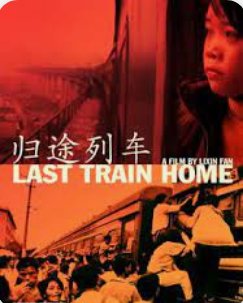This blog was first published on 27 February 2012, on the Innovation Circle network website.

On 27 January 2012 I posted a blog on my other blog site (www.CliffHague.planningresource.co.uk) about another Chinese film, “Mr.Tree”. That film looked at the impact of migration from villages to new urban apartments. It showed how the village leader and his friends were able to develop a coal mine, while displacing the residents of the village to get. Eventually there is an accident in the mine and the wells from which villagers draw their water dry up.
“Mr.Tree” is a rather whimsical film, as the events are portrayed mainly through the eyes of the local “village idiot”, Shu (which translates as “tree”). In contrast, “Last Train Home” is a much more focused and gritty movie. The opening shots pan from above across a seething mass of humanity jostling outside the station in Guangzhou to try to buy tickets. Amongst them are Changhua and Sugin Zhang who work as machinists making garments in a textile factory. Working conditions are bad verging on dangerous, as sewing machines whirl beneath fluorescent lights to turn out the garments westerners crave. They share their narrow bed in a dormitory, with a tatty curtain as their only means of privacy.
At the start of the 1990s the couple left their village and baby daughter Qin to seek work in China’s foremost Special Economic Zone. They wanted to earn money so that Qin (and then her younger brother too) could get an education and have a better life. The children were brought up by their grandmother, helping her by feeding the pigs and carrying heavy bags of corn cobs from the farm fields. Rural life is hard and offers few rewards, but Qin’s grandmother had stayed because her generation had been told how important agricultural labour was for China’s food supply.
After days of trying, Changhua and Sugin get the precious tickets. We see them crammed with their belongings into the train and follow their 2100 km trip back home (despite some stunning scenery the movie does not make you want to try a trip on China Railways!). The routine is repeated over 3 New Years, though after the 2008 economic crisis, factories have closed and the crush is notably reduced. However, the family reunions becomes increasingly fractious, as Qin becomes a rebellious teenager, quits school and heads off to work and spend in Shenzhen.
Thus, grandma stayed in the village to serve the needs of the country, as they were presented by the government of the time. The next generation, those who were teenagers when the economic reforms began in the 1980s, left for far away cities, sacrificing their own lives as parents to create a better future for their children. Now Qin’s generation, China’s young people of today, long to migrate to the bright lights of the city, where they can earn wages that enable them to buy the fashion goods and live the life of western consumers. You don’t imagine that Qin will send money home or make that arduous trek each New Year.
Urban growth, economic change and social change are intertwined. Across two generations they have transformed China. There is a fascinating little scene in the movie where the passengers, sardined into a carriage on the train, chat. One works in a factory manufacturing tennis and squash rackets. They note that at present all the brand leaders in this line of business are western names, but they assert that China’s own brand is just as good. In the near future Chinese labels will be global players.
After the showing there was a panel discussion in which Professor Ya Ping Wang from Heriot-Watt University gave some profound and witty remarks. He grew up in a village in inland china. He worked on the land as a boy, carrying corn in baskets on his back, just like Qin’s brother does in the film. In contrast he mused that his 15 year-old Edinburgh-born son feels put upon if he is asked to do the washing up!
Ya Ping is probably the world’s leading authority on the housing of China’s migrant workers, having done several research projects that involve extensive interviewing. He reported that there have been some gradual improvements in pay and conditions, largely due to increasing competition, and that the real fear of the workers is that they will lose their job. The focus of his work is on raising awareness of policy makers in China’s government about these workers.
“Last Train Home” provides a fascinating insight to how and why China is changing so quickly. It shows rural to urban migration in different forms and in a different culture.
![]()







